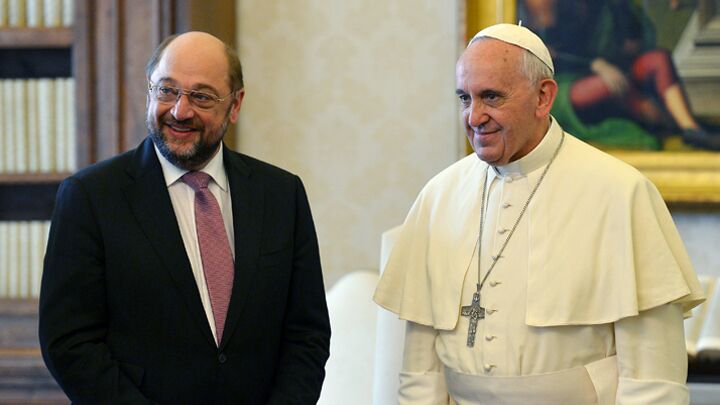
Pope Francis Invited to Address EU Parliament
EU Parliament President Martin Schulz invited Pope Francis to visit the European Parliament during an October 11 meeting with the pontiff.
According to the Vatican Insider’s Giacomo Galeazzi, the pope wouldn’t be satisfied with merely visiting the parliament and having a few photos with politicians. “Bergoglio is no fan of blown-up media campaigns unless he can see concrete results, so a papal visit to Strasbourg would mean a crammed schedule with lots of topics to discuss,” he wrote.
If the pope visits Parliament, he’ll want his visit to have “concrete results.” He wants to make a difference in the EU.
In fact, he’s already trying to make a difference. After nearly 400 illegal immigrants died in boat crashes near Lampedusa in the Mediterranean, the pope wants the EU to do more to save the lives of immigrants traveling to Europe.
To many, this is a noble cause. No one wants to see people drown. If the pope spoke to a European politician about getting more people to church, having crosses displayed in school, or outlawing abortion, people all over the continent would be up in arms about the separation of church and state. Instead the pope is claiming the role of the conscience of the Continent, and nobody minds.
Another intriguing part of the visit was the gift Schulz presented to the pope: a book of Sunday prayers, and a book on Aachen Cathedral. This cathedral is the place where Charlemagne is buried—Europe’s medieval leader who sought to unite Europe using the Catholic Church. Despite his bloody history, he is often looked to by European politicians as an inspiration.
Schulz was born near Aachen and evidently has a great love for the place. He brought one person with him to his interview with the pope: the mayor of Aachen. This goes beyond Schulz merely loving his home town. Many other European leaders probably love their home towns too, but they don’t take the mayor to meet the pope.
Aachen and Charlemagne are a symbol of Europe united under the Catholic Church. That’s a symbol that resonates throughout the European Union.
At the time they were hashing out the details of the European Monetary System (a precursor to the euro), then French President Valéry Giscard d’Estaing and German Chancellor Helmut Schmidt held a summit in Aachen. Bernard Connolly writes in his book The Rotten Heart of Europe, “The symbolism was heavily underlined in both France and Germany; the two leaders paid a special visit to the throne of Charlemagne and a special service was held in the cathedral; at the end of the summit, Giscard remarked that: ‘Perhaps when we discussed monetary problems, the spirit of Charlemagne brooded over us.’”
So Schultz invited the pope to come into the official center of the EU’s power, where he’ll want to have “concrete results.” And he gave the pope a book about the final resting place of Charlemagne, a king who used the Catholic Church as a core part of his government machinery.
EU leaders have often talked about the heritage and legacy of Charlemagne. Schulz’s visit to the pope proves that at least some of Europe’s leaders still dream of resurrecting that legacy.
As that dream is made a reality, to many in Europe, it will look like a good thing. The Catholic Church could act as the conscience of the Continent, fighting against the indifference and moral decadence of a secular society.
But look at any time that religion has been given major power in conjunction with the state. It hasn’t ended well. There’s a reason why many nations separate church and state.
The heritage of Charlemagne gives us good reason to beware of the Catholic Church gaining too much power at the top of the European Union. To learn more about that history, read Trumpet editor in chief Gerald Flurry’s article “Is Germany’s Charlemagne About to Appear?”
